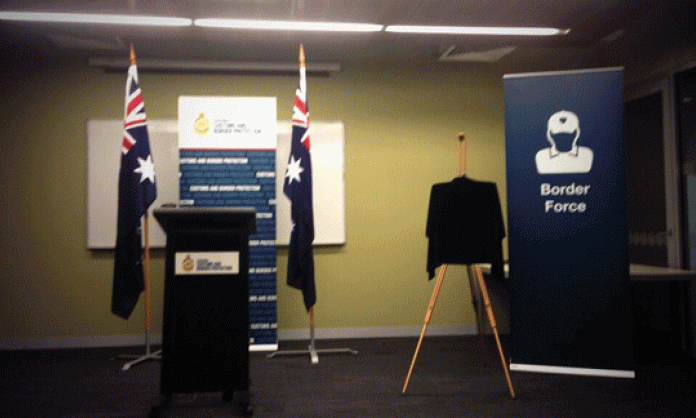Two months ago, the findings of the Moss Review shone a light on endemic sexual abuse in the Nauru detention centre.
The disregard for human life and cynical politicking of the Liberal government were best summed up by Tony Abbott’s flippant response. In an interview on Macquarie Radio in the aftermath of the report, he quipped: “Occasionally, I dare say, things happen … Because in any institution you get things that, occasionally, aren’t perfect”.
However, the institutionalised abuse of asylum seekers by the federal government seems set only to be more deeply entrenched. The government knows this.
It is attempting to silence whistleblowers who try to expose the conditions in Australia’s offshore concentration camps, by threatening them with jail. At the same time, it is handing more powers to officers and guards to use violence against detainees.
Border Force
On 14 May, the Australian Border Force bill quietly passed through the Senate. The bill merges the Department of Immigration and the Department of Customs and Border Protection. The aggressively branded Australian Border Force will act as its enforcement arm.
Section six of the bill, “Secrecy and disclosure provisions”, is most disturbing. It states that any Immigration and Border Protection worker who records or discloses “protected” information will face two years’ imprisonment.
The logic of this move, from the perspective of Abbott and immigration minister Peter Dutton, is simple: to restrict the flow of information and cast a shroud of secrecy over Australia’s concentration camps.
Many previous disclosures of the degrading and inhumane practices on Nauru have come from former Immigration staff and subcontractors such as Salvation Army workers Nicola Judge and Simon Taylor, who last year spoke out after witnessing horrific mistreatment in the facility.
Greens senator Sarah Hanson-Young was one of the few to speak out against the bill, denouncing the further militarisation of immigration policy: “[We] will continue to remind our colleagues that asylum seekers are not a threat to us. They do not require a military response or a ‛border force’”.
She also criticised the punitive anti-whistleblower measures: “The current culture inside our detention centres, inside our Immigration Department and inside our minister’s office is about secrecy and cover-up. This bill would stop public servants from being able to raise genuine, serious concerns about what is going on”.
ALP senator Kim Carr expressed wholehearted support for the measures, describing them as “non-controversial legislation”.
‘Good order’
The coup de grace of the latest rash of anti-refugee measures comes with the recently tabled Maintaining the Good Order of Immigration Detention Facilities bill. The purpose is to establish the legal right of guards to use physical force against detainees on Nauru.
To qualify for the use of violence, guards must fulfil the training requirements of the minister, which can be set at the minister’s discretion.
The bill sets out clearly the parameters for the acceptable use of violence. The two primary justifications are to protect the life of any person in a detention centre and to “maintain the good order, peace or security of an immigration detention facility”.
The second clause is ominous. In February last year, Iranian asylum seeker Reza Barati was murdered on Manus Island during one such disturbance of “good order”. This bill will further legitimise the power of guards in offshore detention facilities.








